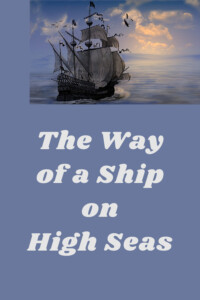The Way of a Ship on the High Seas
The “way of a ship” from Proverbs.
There are three things, the writer of Proverbs says, that are amazing to him – four that he does not understand. Then he lists them, one by one. The first one is “the way of an eagle in the air.” You can read that here. The second one is “the way of a snake on a rock.” Click here to read the second part.
A ship’s power
A ship sails into storms with the bow facing forward. It is designed for give and take as it wrestles through billows and storms. Cargo ships try to stay well offshore when there is a major storm at sea. If the ship is too close to land, the storm can drive the ship onto the land. Brian Anderson says:
If your ship is built correctly, . . . it’ll take the beating not by force, but by a calculated give and take.
Any massive seafaring ship worth its weight in salt is designed to flex through rough waters—. . . maritime engineers and architects who build these things . . . [do so by] . . . calculations to allow big ships to twist slowly side to side like a sea snake on Ativan, and also bow up and down (this is what’s known as hog and sag.) If not for these applied mathematicals, the vessels would literally snap apart.
A ship is built to withstand the tempests it meets. It is built to transport passengers and cargo from one shore to another. Sometimes a ship is built for the purpose of defense or protection. No matter its purpose, it must be built to withstand the waves on the oceans. When it glides across smooth waters or moves in rhythm with turbulence, it is a sight of beauty.
The way of a ship on high seas
High seas are international bodies of salt water without jurisdiction of specific countries and shores. The water is open, free, and continually moving with the ebb and flow of the tides. The way of a ship on high seas is to slice through oceans of depth, moving from one continent or country to another. It involves transfer and time. The way of a ship on high seas is to bend and move with the waves, whether they be turbulent or calm. The ship is not changed by the storms or the calm; it merely responds without flexing resistance, riding out the storms. This is how it is sustained.
Learning from a ship on high seas
Ships are designed and built to charter waters, no matter how soft or strong the gale. Ships are designed to flex through turbulence, remaining unbroken. There is power in the way the ship is built – and even more power in the way it handles itself during turbulence, using its design to move in sync with the storm instead of against the storm. We are designed to withstand turbulence because our Maker is our sustainer. Our purpose is to continue to move through chartered or unchartered waters without breaking because we bend with the wind and come out strong. By keeping the bow facing forward into the storm, we remain strong. Our course is set by the Word of God. When we follow that course, we remain safe.








